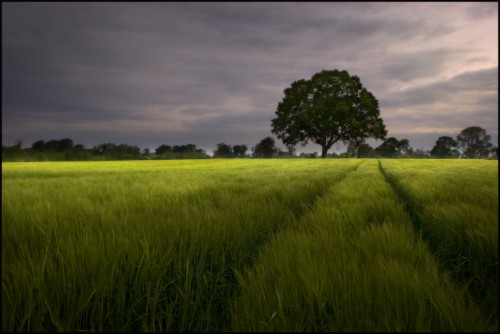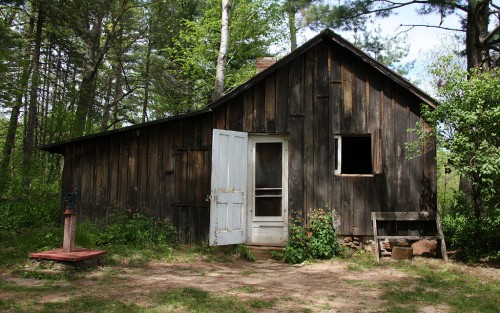Last week I mentioned something the great American conservationist Aldo Leopold had noticed: namely, a “widespread conviction that our whip-hand over nature is no unmixed blessing. We have gained an easier living, but in the process of getting it we are losing two things of possibly equal value: (1) The permanence of the resources whence comes our bread and butter; (2) the opportunity of personal contact with natural beauty.”
My purpose there was to direct attention to the first of these concerns—“the permanence of the resources whence come our bread and butter,” which, I said, are in jeopardy. I said this because they are in jeopardy. Our rates of soil erosion and aquifer depletion alone ought to be enough to put every able-bodied person in search of a row to hoe. Anyone interested in eating should be interested in the sources whence come the bread and butter.
The second concern—namely, “the opportunity of personal contact with natural beauty”—I have so far left alone and will do so a bit longer. What I wish to consider next is the whip-hand over nature.
It is fair to assume that Leopold used the phrase advisedly, and it isn’t only that he knew enough to go for the vivid image wherever it was available. (“Scepter and crown,” as all good writers know, is a stronger workhorse than “monarchical authority,” no matter the sentence.) Rather, it’s that Leopold wished to imply that there is something adversarial in man’s current relation to nature. As a conservationist and a game manager he understood that man necessarily exercises control over his world (even our ability to mourn is “objective evidence of our superiority over the beasts,” he said in Sand County Almanac), but he hung the term “whip-hand” on us as a reminder, without elaboration, that subduing nature, that imposing upon it a will often drunk with the shallow drafts of too little learning, often comes with a price. In the case of the essay at hand the price is spent natural capital whence come our bread and butter.
The term “whip-hand” should remind anyone familiar with the intellectual history of the west that the modern project—I mean the project of bringing nature to heel—began with such language. When Machiavelli recommended that we increase our power to extract what we want from nature, that we subjugate nature and conquer an unyielding and niggardly Fortune lest it turn our infinite desires into misery, he articulated a theme upon which several impresarios of modernity would play variations: In Leviathan Hobbes spoke of that “perpetuall and restlesse desire of Power after power, that ceaseth onely in Death”; in the Discourse on Method Descartes promised that science would make us “lords and possessors of nature”; Bacon, in the Novum Organum, said we could ease man’s estate by treating Nature as a prisoner and vexing her secrets out of her in order to achieve what in The Advancement of Learning he called “relief of the human estate,” or what Hobbes called “commodious living.” “Social progress,” said Thomas Huxley about two hundred years later, “means a checking of the cosmic process at every step.” Progress means establishing “an earthly paradise, a true garden of Eden, in which all things should work together towards the well-being of the gardeners: within which the cosmic process, the coarse struggle for existence of the state of nature, should be abolished.”
Leopold remarked on more than one occasion that “the modern dogma is comfort at any cost.” That is not a bad gloss on the modern project of bringing nature to heel. And the project has been carried out with the fervor of so strong a faith in progress as to make religious fundamentalism seem nuanced by comparison. But such belief is achieved at the cost of seeing some things by turning a blind eye to others. So wowed are we by the gee-whizzery of technological innovation, so completely Googlified have we become, that we are now in the absurd position of believing that technology will rescue us when the sources whence come our bread and butter fail.
But this is a confusion of categories, and it is a serious problem. Leopold, discussing advances in agriculture, put the matter thus:
The ecological fundamentals of agriculture are just as poorly known to the public as in other fields of land-use. For example, few educated people realize that the marvelous advances in technique made during recent decades are improvements in the pump, rather than the well. Acre for acre, they have barely sufficed to offset the sinking level of fertility.
Education, he said, was doing little to make plain the important distinction between pumps and wells, or between technology and resources. Moreover, “the education actually in progress makes no mention of obligations to land over and above those dictated by self-interest. The net result is that we have more education but less soil, fewer healthy woods, and as many floods as in 1937.”
“Hence,” he said elsewhere, “we have dustbowls, and rivers washing the future to the sea.”
For this and other reasons Leopold was at great pains to divert our attention from the shiny distractions that tell us all is well and back to the actual sources:
There is value in any experience that reminds us of our dependency on the soil-plant-animal-man food chain, and of the fundamental organization of the biota. Civilization has so cluttered this elemental man-earth relation with gadgets and middlemen that awareness of it is growing dim. We fancy that industry supports us, forgetting what supports industry. Time was when education moved toward the soil, not away from it. The nursery jingle about bringing home a rabbit skin to wrap the baby bunting in is one of many reminders in folk-lore that man once hunted to feed and clothe his family.
But the whip-hand has ushered in an era of general amnesia that no amount of folklore can redress. Temporary victories over nature—and they are temporary (just ask all the bacteria now laughing at antibiotics)—can dupe us into thinking we’ve done it: we’ve brought nature to heel.
It is not likely that nature will suffer our arrogance much longer, that soon she’ll be bringing us to heel, perhaps with a much heavier whip-hand than the one we’ve been wielding. Supposing the Baconian relation to be true—man the torturer and nature the prisoner—we have gone deaf to better instruction. Edmund Spenser called nature our mother and our judge. She might be obliged sometimes to step in as judge, meting out penalties to those who forgot her in her other role.
Leopold’s use of “whip-hand” was fitting. It stood in, in all its brevity, for a long history and long-standing practice. But the dangers of being Descartes’ lords and possessors of nature ought by now to be apparent to anyone with eyes.
And William Blake, at the dawn of the industrial madness, was prescient enough to remind us that the bounded is loathed by its possessor. That, maybe, is the wrong attitude to take.







Christianity has recently been blamed for this state of affairs, but the “take dominion over the earth” of Genesis can easily be read as “exercise stewardship over the earth” something only humankind is in a position to do; no other animal can do it.